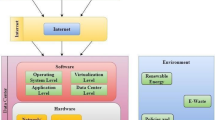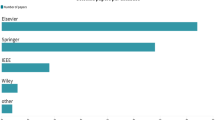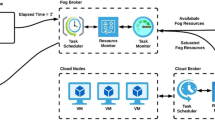Abstract
We investigate that resource provisioning and scheduling is a prominent problem due to heterogeneity as well as dispersion of cloud resources. Cloud service providers are building more and more datacenters due to demand of high computational power which is a serious threat to environment in terms of energy requirement. To overcome these issues, we need an efficient meta-heuristic technique that allocates applications among the virtual machines fairly and optimizes the quality of services (QoS) parameters to meet the end user objectives. Binary particle swarm optimization (BPSO) is used to solve real-world discrete optimization problems but simple BPSO does not provide optimal solution due to improper behavior of transfer function. To overcome this problem, we have modified transfer function of binary PSO that provides exploration and exploitation capability in better way and optimize various QoS parameters such as makespan time, energy consumption, and execution cost. The computational results demonstrate that modified transfer function-based BPSO algorithm is more efficient and outperform in comparison with other baseline algorithm over various synthetic datasets.










Similar content being viewed by others
References
Kumar M, Dubey K, Sharma SC (2018) Elastic and flexible deadline constraint load balancing algorithm for cloud computing. Procedia Comput Sci 125:717–724
Chen H, Liu G, Yin S, Liu X, Qiu D (2018) Erect: energy-efficient reactive scheduling for real-time tasks in heterogeneous virtualized clouds. J Comput Sci 28:416–425
Barroso L, Holzle U (2007) The case for energy proportional computing. IEEE Comput 40(12):33–37
Frîncu ME (2012) Scheduling highly available applications on cloud environments. Future Gener Comput Syst 32(6):138–153
Ramezani F, Hussain FK (2013) Task-based system load balancing in cloud computing using particle swarm optimization. Int J Parallel Prog 42(5):739–754
Kennedy J, Eberhart RC (1995) Particle swarm optimization. In: Proceedings of the IEEE international conference on neural networks, pp 1942–1948
Kennedy J, Eberhart RC (1997) A discrete binary version of the particle swarm algorithm. In: IEEE international conference on systems, man, and cybernetics, pp. 4104–4108
Babu D, Venkata P (2013) Honey bee behavior inspired load balancing of tasks in cloud computing environments. Appl Soft Comput 13(5):2292–2303
Pacini E, Mateos C, Garino CG (2015) Balancing throughput and response time in online scientific clouds via ant colony optimization (SP2013/2013/00006). Adv Eng Softw 84:31–47
Tsai JT, Fang JC, Chou JH (2013) Optimized task scheduling and resource allocation on cloud computing environment using improved differential evolution algorithm. Comput Oper Res 40(12):3045–3055
Dasgupta K, Mandal B, Dutta P, Mondal JK, Dam S (2013) A genetic algorithm (GA) based load balancing strategy for cloud computing. Procedia Technol 10:340–347
Chen H, Wang F, Helian N, Akanmu G (2013) User-priority guided min-min scheduling algorithm for load balancing in cloud computing. In: National conference on parallel computing technologies, Bangalore, KA, pp 1–8
Elzeki OM, Reshad MZ, Cloud MA (2012) Improved max–min algorithm in cloud computing. Int J Comput Tasks 50:22–27
Devi DC, Uthariaraj VR (2016) Load balancing in cloud computing environment using improved weighted round robin algorithm for nonpreemptive dependent tasks. Sci World J 2016:1–14
Kumar M, Sharma SC (2017) Dynamic load balancing algorithm for balancing the workload among virtual machine in cloud computing. Procedia Comput. Sci. 115:322–329
Kumar M, Sharma SC (2017) Deadline constrained based dynamic load balancing algorithm with elasticity in cloud environment. J Comput Electr Eng (CAEF). https://doi.org/10.1016/j.compeleceng.2017.11.018
Gill S, Channa I (2015) Q-aware: quality of service based cloud resource provisioning. Comput Electr Eng 47:138–160
Khargharia B, Hariri S, Szidarovszky F, Houri M, Rewini H, Khan S, Ahmad I, Yousif M (2007) Autonomic power & performance management for large-scale data centers. In: International parallel and distributed processing symposium, pp 1–8
Sheikh H, Ahamd I, Wang Z, Ranka S (2012) An overview and classification of thermal-aware scheduling techniques for multi-core processing systems. Sustain Comput Inform Syst 2(3):151–169
Sheikh H, Ahmad I, Fan D (2015) An evolutionary technique for performance-energy-temperature optimized scheduling of parallel tasks on multi-core processors. IEEE Trans Parallel Distrib Syst 27(3):668–681
Zhang Y, Gong D, Ding Z (2011) Handling multi-objective optimization problems with a multi-swarm cooperative particle swarm optimizer. Expert Syst Appl 38(11):13933–13941
Gong D, Sun J, Ji X (2013) Evolutionary algorithms with preference polyhedron for interval multi-objective optimization problems. Inf Sci 233:141–161
Han Y, Gong D, Sun X (2015) A discrete artificial bee colony algorithm incorporating differential evolution for the flow-shop scheduling problem with blocking. Eng Optim 47(7):927–946
Zhang Y, Gong D, Cheng J (2017) Multi-objective particle swarm optimization approach for cost-based feature selection in classification. IEEE/ACM Trans Comput Biol Bioinform (TCBB) 14(1):64–75
Meng Z, Pan J (2016) Monkey king evolution: a new memetic evolutionary algorithm and its application in vehicle fuel consumption optimization. Knowl-Based Syst 97:144–157
Meng Z, Pan J, Kong L (2018) Parameters with adaptive learning mechanism (PALM) for the enhancement of differential evolution. Knowl-Based Syst 141:92–112
Pan J, Kong L, Sung T, Tsai P, Snasel V (2018) A clustering scheme for wireless sensor networks based on genetic algorithm and dominating set. J Internet Technol 19(4):1111–1118
Pan J, Kong L, Sung T, Tsai P, Snasel V (2018) α-Fraction first strategy for hierarchical model in wireless sensor networks. J Internet Technol 19(6):1717–1726
Meng Z, Pan J (2019) HARD-DE: hierarchical archive based mutation strategy with depth information of evolution for the enhancement of differential evolution on numerical optimization. IEEE Access 7:12832–12854
Zhang YD, Zhang Y, Lv Y, Hou X, Liu F, Jia W, Yang M, Phillips P, Wang S (2017) Alcoholism detection by medical robots based on Hu moment invariants and predator–prey adaptive-inertia chaotic particle swarm optimization. Comput Electr Eng 63:126–138
Zhang Y, Wang S, Sui Y, Yang M, Liu B, Cheng H, Sun J, Jia W, Phillips P, Gorriz JM (2018) Multivariate approach for Alzheimer’s disease detection using stationary wavelet entropy and predator-prey particle swarm optimization. J Alzheimers Dis 65(3):855–869
Zuo X, Zhang G, Tan W (2014) Self-adaptive learning PSO-based deadline constrained task scheduling for hybrid IaaS cloud. IEEE Trans Autom Sci Eng 11(2):564–573
Verma A, Kaushal S (2017) A hybrid multi-objective particle swarm optimization for scientific workflow scheduling. Parallel Comput 62:1–19
Cho KM, Tsai PW, Tsai CW, Yang CS (2014) A hybrid meta-heuristic algorithm for VM scheduling with load balancing in cloud computing. Neural Comput Appl 26(6):1297–1309
Gill SS, Buyya R, Chana I, Singh M, Abharam A (2018) BULLET: particle swarm optimization based scheduling technique for provisioned cloud resources. J Netw Syst Manag 26(2):361–400
Islam MdJ, Li X, Mei Y (2017) A time-varying transfer function for balancing the exploration and exploitation ability of a binary PSO. Appl Soft Comput 59:182–196
Naeem M, Pareek U, Lee DC (2012) Swarm intelligence for sensor selection problems. IEEE Sens J 12(8):2577–2585
Lin JCW, Yang L, Viger PF, Hong TP, Voznak M (2016) A binary PSO approach to mine high-utility itemsets. Soft Comput 21(17):1–19
Kennedy J, Eberhart RC (1997) A discrete binary version of the particle swarm algorithm. Int Conf Syst Man Cybern 5:4104–4108
Bansal JC, Deep K (2012) A modified binary particle swarm optimization for knapsack problems. Appl Math Comput 218(22):11042–11061
Mirjalili S, Lewis A (2013) S-shaped versus v-shaped transfer functions for binary particle swarm optimization. Swarm Evolut Comput 9:1–14
Hua LJ, Hua YR, Hua SS (2011) The analysis of binary particle swarm optimization. J Nanjing Univ (Nat Sci) 47:504–514
Kumar M, Sharma SC (2018) PSO-COGENT: cost and energy efficient scheduling in cloud environment with deadline constraint. Sustain Comput Inform Syst 19:147–164
Gill SS, Chana I, Singh M, Buyya R (2017) CHOPPER: an intelligent QoS-aware autonomic resource management approach for cloud computing. Cluster Comput 21:1203–1241
Author information
Authors and Affiliations
Corresponding author
Ethics declarations
Conflict of interest
The authors whose names are given in this article certify that they have no affiliations with or involvement in any organization or entity with any financial interest (such as honoraria; educational grants; participation in speakers’ bureaus; membership, employment, consultancies, stock ownership, or other equity interest; and expert testimony or patent-licensing arrangements), or non-financial interest (such as personal or professional relationships, affiliations, knowledge or beliefs) in the subject matter or materials discussed in this manuscript.
Additional information
Publisher's Note
Springer Nature remains neutral with regard to jurisdictional claims in published maps and institutional affiliations.
Rights and permissions
About this article
Cite this article
Kumar, M., Sharma, S.C., Goel, S. et al. Autonomic cloud resource provisioning and scheduling using meta-heuristic algorithm. Neural Comput & Applic 32, 18285–18303 (2020). https://doi.org/10.1007/s00521-020-04955-y
Received:
Accepted:
Published:
Issue Date:
DOI: https://doi.org/10.1007/s00521-020-04955-y




